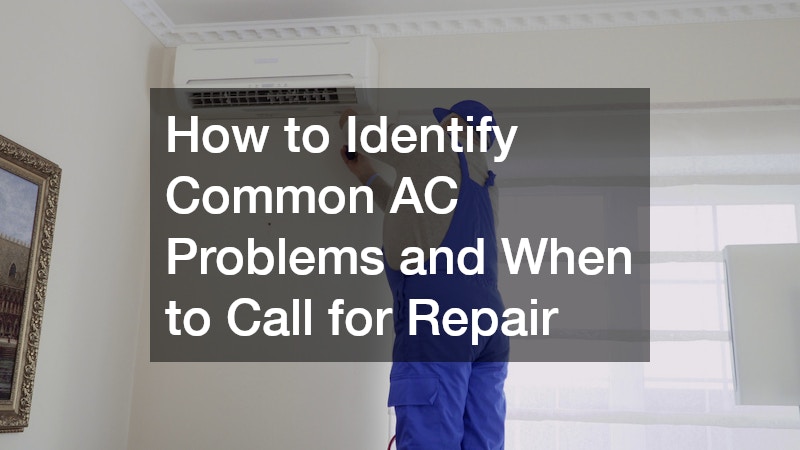This article provides a comprehensive guide on identifying common air conditioning (AC) problems and recognizing when professional AC repair is necessary. By understanding typical symptoms and their potential causes, homeowners can make informed choices about addressing issues themselves or seeking expert help. Air conditioners are complex systems that require regular maintenance and timely intervention when issues arise to ensure they operate efficiently.
Checking the Thermostat Settings
One of the first steps to take when your AC isn’t cooling properly is to check the thermostat settings. Ensure it is set to the correct temperature and mode, whether cooling or fan.
It is crucial to verify if the thermostat is functioning properly, as a malfunctioning device can lead to inadequate cooling or even cause the AC to not turn on at all.
Sometimes, the issue can be as simple as a user setting error, such as the thermostat being set to “heat” instead of “cool.” It’s important to ensure the thermostat has fresh batteries, if applicable, and connections are secure. Thermostat issues, while seemingly minor, can significantly impact the comfort levels in your home and the efficiency of your AC.
Inspecting Air Filters for Clogs
Dirty or clogged air filters can severely impact the AC’s efficiency by restricting airflow. As the airflow is obstructed, the system struggles to maintain the desired temperature, causing it to work harder and less efficiently. This not only reduces cooling efficiency but also increases energy consumption and can lead to a spike in utility bills.
Inspecting the air filter should be part of regular AC maintenance, ideally every one to two months, especially during heavy use periods. Replacing a dirty filter is often a simple fix, enhancing airflow and allowing the system to cool your home effectively. Ignoring this maintenance can result in more significant issues down the line, potentially requiring professional intervention.
Assessing Refrigerant Levels
The refrigerant plays a crucial role in the cooling process by absorbing heat from the environment and releasing it outside. An undercharged system or refrigerant leaks can affect cooling performance and efficiency. Low refrigerant levels often indicate a leak, and refilling the refrigerant without fixing the leak can result in ongoing issues.
It is important to note that handling refrigerant is not a DIY project, as it requires specific tools and expertise. Leaks can pose environmental hazards and lead to system wear and tear, necessitating professional repair to ensure proper operation. Identifying and fixing leaks promptly can prevent further damage and help maintain the system’s cooling capabilities.
Examining Fan Motors and Blades
Fan motors and blades are essential components ensuring proper air circulation within your AC unit. Issues with these parts can lead to strange noises and reduced efficiency in cooling. Loose blades or faulty fan motors often result in clanging or mechanical noises, affecting both performance and energy efficiency.
Regular inspection of fan blades and motors should form part of routine maintenance checks. Ensuring components are secure and free of debris keeps the system running smoothly and quietly. Avoiding neglect of these checks can prevent operational inefficiencies and minimize the need for costly repairs.
Checking for Loose Components
Loose components within the AC unit can cause a variety of noises, including rattling or vibrating sounds. Such issues not only affect performance but can also lead to additional wear and tear if left unaddressed. Identifying and securing loose parts can resolve noise problems and enhance the unit’s overall efficiency.
Routine checks of bolts, screws, and fasteners should be conducted to ensure all parts are secure and in proper alignment. Securing these components prevents them from causing further issues or damaging other parts of the system. These checks can often be performed by the homeowner, but persistent problems may require professional intervention.
Complex Electrical Problems
Tackling electrical issues in an AC unit without professional experience is highly discouraged due to potential hazards. Complex electrical problems require specialized knowledge to diagnose and repair safely and efficiently. Attempting DIY solutions in this area can result in safety risks, further damage to the unit, and voiding of warranties.
Issues such as faulty wiring, insufficient power supply, or motor failures should be handled by certified technicians equipped to deal with such complexities. Professionals follow safety protocols and have access to the tools and replacement parts required to address electrical faults. Ensuring these repairs are handled by qualified individuals minimizes risks and guarantees a higher standard of workmanship.
Recognizing Refrigerant Leaks
Refrigerant leaks in AC systems necessitate immediate professional attention due to their environmental and operational implications. Signs of a leak include hissing sounds, reduced cooling efficiency, or ice formation on the coils. Professional handling of refrigerant is crucial due to regulatory requirements and the specialized procedures needed for repair.
By learning to identify common AC issues, homeowners can take proactive steps to maintain their systems. However, understanding when to call in professional help is crucial to ensuring the efficiency and longevity of your AC unit. Proper maintenance and timely repairs can significantly enhance comfort and energy efficiency, leading to long-term savings.




